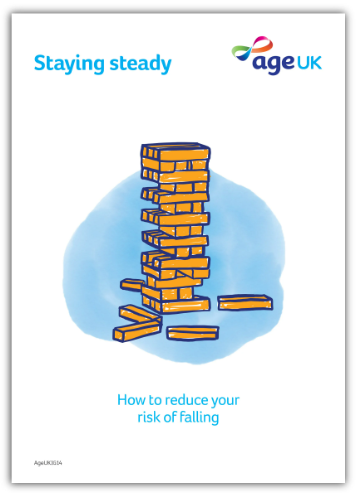Preventing Falls

As we get older, it’s common to feel a little unsteady on our feet - and this can make us worried about falling. The good news is that there are lots of things you can do to stay steady and reduce your risk.
Jump to section:
What can I do to prevent a fall?
Although falls become more of a concern as we get older, they aren’t inevitable. There are many simple steps you can take to reduce your risk — and we’re here to help if you feel you need extra support.
If you’ve started to feel less steady on your feet, don’t ignore it. Reaching out early — whether to your GP, your local council, or Age UK East Sussex — could help you remain independent for longer.
Stay active
Keeping moving is one of the best ways to prevent falls. Exercise helps maintain strength, balance and coordination. This doesn’t need to be strenuous — a short walk, some gentle stretching, or even chair-based exercises can all make a difference.
At our Isabel Blackman Centre in Hastings and through our local groups, you’ll find safe, friendly exercise classes designed for older people.
Eat well and stay hydrated
A balanced diet and plenty of fluids are key to keeping your energy levels up and reducing dizziness. If you struggle with appetite, try small snacks throughout the day rather than three large meals. Aim for 6–8 glasses of fluid daily — not just water, but also tea, coffee or sugar-free squash.
Take care of your eyes and hearing
Good vision and hearing play a big part in balance. Make sure you have regular eye tests (at least every two years) and speak to your GP if you notice changes to your hearing. Both can reduce your risk of falls and improve confidence when out and about.
Manage your health and medicines
Certain conditions like diabetes, low blood pressure, or side effects from medicines can make you feel faint or dizzy. Always tell your GP or pharmacist if you notice changes, so they can review your medication or adjust treatment.
Support your bones and feet
Stronger bones mean fewer injuries if you do fall. Keep them healthy through regular activity, a calcium-rich diet, and vitamin D — either from safe sunlight exposure or a daily supplement.
Don’t overlook foot care either. Pain, reduced sensation, or inappropriate footwear can increase your risk of falling. Speak to your GP or nurse about any problems, and choose supportive shoes with good grip.
Make your home fall-proof
Simple changes at home can make a big difference:
-
Keep walkways clear of clutter, rugs or trailing wires
-
Fit handrails by stairs, the bath or in the garden
-
Add non-slip mats where needed
-
Consider night lights or motion-activated lighting
If you live in East Sussex, your local council’s adult social care team can advise on adaptations and may offer a free care needs assessment.
If you are worried about falling
It’s normal to feel nervous, especially if you’ve had a fall before. But with the right help, you can feel confident again.
-
Talk to your GP: They can check your balance, refer you for a falls assessment, or connect you with the local falls prevention service.
-
Ask about home safety checks: Some councils and charities (including Age UK East Sussex through our partners) may offer handyperson schemes to help with small repairs and safety adaptations. East Sussex County Council also offers alarms and monitors to enable people to live independently.
- Consider telecare or a personal alarm: A pendant or wristband alarm means you can call for help 24/7 if you fall.
How Age UK East Sussex can help
If you’re concerned about falls or want to feel more confident at home and out in the community, we’re here for you. Our friendly Information and Advice service can guide you towards local support, falls prevention groups, and community activities.
📞 Call us on 01273 476704 or email information@ageukeastsussex.org.uk for advice.
Together, let’s make East Sussex a great place to grow older.
At Age UK East Sussex, we’re here to help you stay independent, active and safe in your home and community.
What can I do to prevent a fall?
Although falls become more of a concern as we get older, they aren’t inevitable. There are many simple steps you can take to reduce your risk - and we’re here to help if you feel you need extra support.
If you’ve started to feel less steady on your feet, don’t ignore it. Reaching out early - whether to your GP, your local council, or Age UK East Sussex - could help you remain independent for longer.
Take care when you’re out and about
With wet weather and falling leaves in autumn and winter, your risk of slipping can increase. It’s important to plan ahead, wear sensible footwear, and take extra care when you’re on the move.
Keep Connected
You can join our free Connect Service and have our up-to-date information and advice delivered to your inbox on a monthly basis.
 Staying steady information guide
Staying steady information guide
This guide outlines things you can do to reduce your risk of falling. It includes:
- how to stay active to improve your strength and balance
- how to look after your eye and ear health
- tips on looking after your feet and foot health
- suggestions for staying safe at home.
It also lists useful organisations that you can contact for further information or practical support in making changes to help you avoid a fall.
Stay active
Keeping moving is one of the best ways to prevent falls. Exercise helps maintain strength, balance and coordination. This doesn’t need to be strenuous — a short walk, some gentle stretching, or even chair-based exercises can all make a difference.
At our Isabel Blackman Centre in Hastings and through our local groups, you’ll find safe, friendly exercise classes designed for older people.
Eat well and stay hydrated
A balanced diet and plenty of fluids are key to keeping your energy levels up and reducing dizziness. If you struggle with appetite, try small snacks throughout the day rather than three large meals. Aim for 6–8 glasses of fluid daily, not just water, but also tea, coffee or sugar-free squash.
Take care of your eyes and hearing
Good vision and hearing play a big part in balance. Make sure you have regular eye tests (at least every two years) and speak to your GP if you notice changes to your hearing. Both can reduce your risk of falls and improve confidence when out and about.
Manage your health and medicines
Certain conditions like diabetes, low blood pressure, or side effects from medicines can make you feel faint or dizzy. Always tell your GP or pharmacist if you notice changes, so they can review your medication or adjust treatment.
Support your bones and feet
Stronger bones mean fewer injuries if you do fall. Keep them healthy through regular activity, a calcium-rich diet, and vitamin D - either from safe sunlight exposure or a daily supplement.
Don’t overlook foot care either. Pain, reduced sensation, or inappropriate footwear can increase your risk of falling. Speak to your GP or nurse about any problems, and choose supportive shoes with good grip.
Make your home fall-proof
Simple changes at home can make a big difference:
- Keep walkways clear of clutter, rugs or trailing wires
- Fit handrails by stairs, the bath or in the garden
- Add non-slip mats where needed
- Consider night lights or motion-activated lighting
If you live in East Sussex, your local council’s adult social care team can advise on adaptations and may offer a free care needs assessment.
If you’re worried about falling
It’s normal to feel nervous, especially if you’ve had a fall before. But with the right help, you can feel confident again.
-
Talk to your GP: They can check your balance, refer you for a falls assessment, or connect you with the local falls prevention service.
-
Ask about home safety checks: Some councils and charities (including Age UK East Sussex through our partners) may offer handyperson schemes to help with small repairs and safety adaptations. East Sussex County Council also provide equipment to help people live independently for longer.
-
Consider telecare or a personal alarm: A pendant or wristband alarm means you can call for help 24/7 if you fall.
How Age UK East Sussex can help
If you’re concerned about falls or want to feel more confident at home and out in the community, we’re here for you. Our friendly Information and Advice service can guide you towards local support, falls prevention groups, and community activities.
📞 Call us on 01273 476704 or email information@ageukeastsussex.org.uk for advice.
Together, let’s make East Sussex a great place to grow older.
